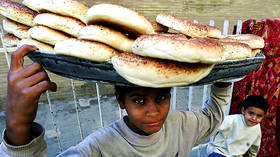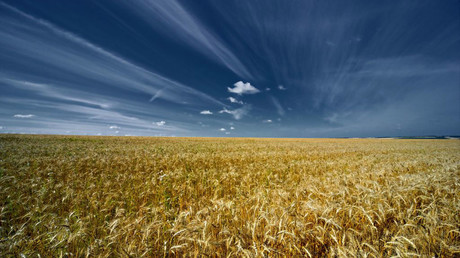- Joined
- Feb 20, 2010
- Messages
- 2,818
- Points
- 48
https://www.rt.com/business/447353-iraq-russian-wheat-supplies/
Post-war Iraq wants to resume imports of Russian wheat – agriculture watchdog
Published time: 25 Dec, 2018 11:17 Edited time: 25 Dec, 2018 11:57
Get short URL

FILE PHOTO A young Iraqi street seller, Baghdad, 2002 © Reuters / Goran Tomasevic
According to the statement, the officials were asked to provide the Iraqi side with data on production volumes in different regions of Russia, as well as information about the types of wheat grown in Russia. The Moscow-based agency pledged to send all the necessary materials to the Iraqi trade ministry.
Read more
 Russia’s grain exports surge more than 54% this year
Russia’s grain exports surge more than 54% this year
“The Iraqi specialists have thanked us for the inspection. They stressed that the country is mainly interested in supplies of durum wheat for potentially processing it into flour,” the statement reads.
The parties are said to have discussed creating a working group for dealing with the issues relating to grains and derivative products.
The last cargo with Russian wheat was shipped to Iraq in 2014. Back then, the country purchased 118,500 tons of wheat and meslin (a mixture of wheat and rye). That amounted to 0.5 percent of Russia’s total exports of wheat and meslin, according to Russia’s Federal Customs Service.
However, Baghdad has been buying some other grains from Russian producers. Last year, Iraq purchased 453,000 tons of barley and 1,456,000 tons of rice.
Iraq’s annual demand for wheat is reportedly five million tons with the current import gap hovering around two million tons a year. Over the recent years, Black Sea grain suppliers have given intense competition to US ones, winning the market share in North Africa and the Middle East.
In November, Iraqi Trade Minister Mohammed Hashim Al-Aani, who also oversees the grain board, said Iraq wants Russia to participate in its state tenders.
Earlier this month, Rosselkhoznadzor said the countries also agreed on the building of grain storage facilities in Iraq and supplies of advanced processing equipment as part of the post-war reconstruction of the country’s agricultural sector.
Post-war Iraq wants to resume imports of Russian wheat – agriculture watchdog
Published time: 25 Dec, 2018 11:17 Edited time: 25 Dec, 2018 11:57
Get short URL

FILE PHOTO A young Iraqi street seller, Baghdad, 2002 © Reuters / Goran Tomasevic
According to the statement, the officials were asked to provide the Iraqi side with data on production volumes in different regions of Russia, as well as information about the types of wheat grown in Russia. The Moscow-based agency pledged to send all the necessary materials to the Iraqi trade ministry.
Read more
 Russia’s grain exports surge more than 54% this year
Russia’s grain exports surge more than 54% this year “The Iraqi specialists have thanked us for the inspection. They stressed that the country is mainly interested in supplies of durum wheat for potentially processing it into flour,” the statement reads.
The parties are said to have discussed creating a working group for dealing with the issues relating to grains and derivative products.
The last cargo with Russian wheat was shipped to Iraq in 2014. Back then, the country purchased 118,500 tons of wheat and meslin (a mixture of wheat and rye). That amounted to 0.5 percent of Russia’s total exports of wheat and meslin, according to Russia’s Federal Customs Service.
However, Baghdad has been buying some other grains from Russian producers. Last year, Iraq purchased 453,000 tons of barley and 1,456,000 tons of rice.
Iraq’s annual demand for wheat is reportedly five million tons with the current import gap hovering around two million tons a year. Over the recent years, Black Sea grain suppliers have given intense competition to US ones, winning the market share in North Africa and the Middle East.
In November, Iraqi Trade Minister Mohammed Hashim Al-Aani, who also oversees the grain board, said Iraq wants Russia to participate in its state tenders.
Earlier this month, Rosselkhoznadzor said the countries also agreed on the building of grain storage facilities in Iraq and supplies of advanced processing equipment as part of the post-war reconstruction of the country’s agricultural sector.
